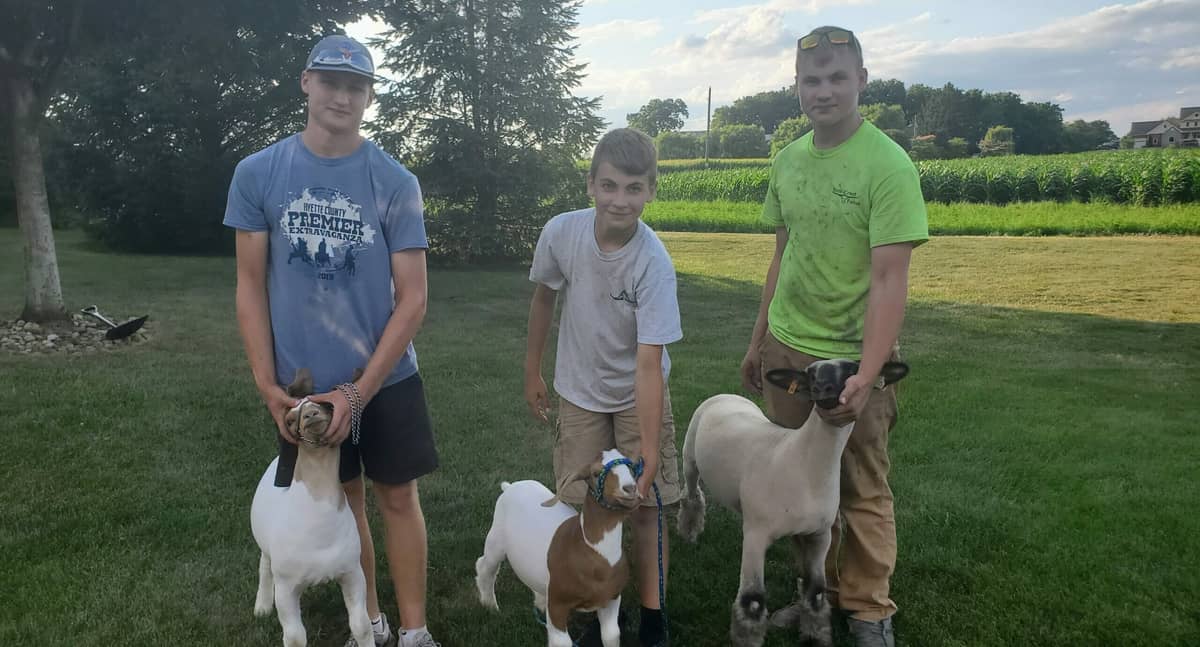In the 1950s and ’60s, Skip Heisey and his siblings showed steer and pigs at the Lebanon Area Fair and other shows.


Once Skip grew up, his son Jason Heisey took up showing pigs, while his three daughters showed steers.
Today, Jason and wife Blythe Heisey’s three sons — Blayne, Alex, and Clayton — show goats.
Each boy started showing market goats at the age of 8. Blayne has been showing for 10 years, Alex has shown eight, and Clayton has shown six.
When the boys were younger, Blythe and Jason said, they helped them out more with preparing for shows. Now, the boys take most of the responsibility themselves.
The family’s goats are bred around this time of year up until August, and the process for next year’s fair starts early.

Goat kids are born late November, early December. Around the same time the kids are weaned, the boys, with guidance from their father, select which ones they plan to compete and which will be sold.
This year, Blythe said, the family had around 30 kids total. They typically narrow it down to around 10 initially, and make final selections as shows approach. Each exhibitor can enter as many animals as they choose on the market side, but can only show two of each species.
Each boy can enter two market goats and three breeding goats in the fair, so they choose which goats they will compete with based on overall health, muscle structure, and general appearance. They are also entering four sheep this year.
Now, the boys are focusing on making sure their entrants are in tip-top shape. Since May, they have needed to routinely groom their animals for jackpot shows, which are one-day events taking place throughout the season.

“That actually has really helped for the fair, because the animals are used to the ring, they’re used to people handling them, they’re used to being fitted, and everything like that,” explained Blythe.

“It also helps the boys become better showmen by going out there and seeing people from other states going against them,” added Jason. “You see different techniques that they pick up, and what works. Their showmanship is really polished better for the fair.”
Leading up to shows, the boys practice walking their entries.

To be judged, the animals also need to be braced, meaning that the exhibitor positions them so that their muscular structure is in clear display for judges.

Leading up to showings Sunday morning, the boys spend a lot of time at the fair to ensure that their entries are perfectly groomed and prepped for judging. They also sell animals Wednesday.
“Because we breed, when one of ours does well, I think it adds recognition to our status as Triple H Show Goats,” said Blythe, referencing the Heisey’s business selling goats.
There are separate categories for showmanship, on top of individual evaluation of animals.
The boys’ performances vary from year to year and even between different categories the same year. Last year, all three boys had selling market goats ranked first place, and placed competitively (including several first place rankings) in various individual categories.
Read More: Youth Goat Show — Full results of the youth animal exhibits at the 2021 Lebanon Area Fair
Youth can compete in 4-H until the age of 18, and then can compete in FFA shows until they turn 21. This year, Blayne — now 18 — is showing goats through FFA and lambs through 4-H.
“As I get older, working with younger members and trying to teach them new things so that they become better showmen,” said Blayne, reflecting on his time in 4-H.
The decision to compete in 4-H is the boys’ own, but one their parents have strongly encouraged throughout their lives.
Showing goats through their lives has taught the boys responsibility and respect, said Jason, the same skills he learned as a youngster.
“Otherwise, if they didn’t have the animals out in the barn they’d be in the house on video games or something,” said Jason.
Blythe grew up going to the Lebanon Area Fair, but she only experienced showing animals firsthand with her sons.
“I think, as a family, it’s taught us a lot because in the barn not everything always goes the way you want it,” said Blythe. “It’s taught them that they need to be patient and be flexible in their thinking. We wouldn’t do this if they didn’t want to do it.”
Blythe also emphasized the importance of the connections the boys have made with other 4-H members not just across the state but across the country.
“I’d say it’s probably one of the best decisions we ever made as parents,” said Blythe of introducing their boys to 4-H.
“100 percent, best decision,” Jason agreed.
Questions about this story? Suggestions for a future LebTown article? Reach our newsroom using this contact form and we’ll do our best to get back to you.

Become a LebTown member.
Cancel anytime.
Monthly Subscription
🌟 Annual Subscription
- Still no paywall!
- Fewer ads
- Exclusive events and emails
- All monthly benefits
- Most popular option
- Make a bigger impact
Already a member? Log in here to hide these messages
Our community deserves strong local news. LebTown delivers in-depth coverage that helps you navigate daily life—from school board decisions to public safety to local business openings. Join our supporters with a monthly or annual membership, or make a one-time contribution. Cancel anytime.
Full Disclosure: The Lebanon Area Fair is an advertiser on LebTown. LebTown does not make editorial decisions based on advertising relationships and advertisers do not receive special editorial treatment. Learn more about advertising with LebTown here.




























